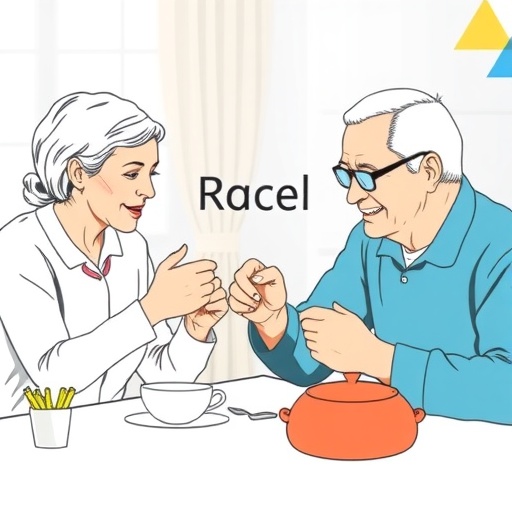During the COVID-19 pandemic, the dynamics of daily life were drastically altered, particularly for the older adult population. Many people in this demographic faced unprecedented challenges as social isolation became the norm. A new study spearheaded by researchers Mikiya, Momoki, and Sawada delves deep into the implications of eating alone, focusing on its correlation with motor function among community-dwelling older adults. Their findings, published in BMC Geriatrics, present crucial insights into how solitude during meal times may influence physical health in this vulnerable group.
The study utilized a cross-sectional design, analyzing data collected from a significant pool of community-dwelling older adults. This population was chosen to ensure that the findings reflected typical experiences during a crisis, where individual dietary habits impacted well-being. By assessing various factors, including demographics, health status, and lifestyle choices, the researchers aimed to draw a comprehensive picture of how solitary eating conditions relate to motor function.
Motor function, defined as the ability to move and coordinate physical activities effectively, is a crucial aspect of daily living. It’s particularly vital for older adults, as impairments can lead to a higher risk of falls, decreased independence, and overall diminished quality of life. In addressing the effects of loneliness and isolation—an unfortunate byproduct of social distancing mandates during the pandemic—the study highlights the potential consequences that arise from seemingly innocuous behaviors such as eating alone.
The findings revealed a concerning trend; older adults who frequently ate alone reported a significant decline in their motor function. While the researchers gathered data, they also took into account the psychological aspects that accompany solitary eating. Nutritional intake, previously established as a critical factor for maintaining strength and motor skills, can be negatively influenced by feelings of loneliness and depression associated with solitary meals.
In the backdrop of nutritional concerns, the researchers also emphasized the role of companionship and its importance in promoting healthier eating habits. Shared meals have long been celebrated for their social benefits, and this study reinforces that notion by highlighting potential physical repercussions stemming from solitary dining experiences. While the complexities of these relationships warrant further examination, the study opens the door to practical implications for public health initiatives aimed at seniors.
Additionally, the study also explored environmental factors that could influence both dietary practices and motor function. Access to food and social environments plays a significant role in the eating habits of older adults. Therefore, interventions aimed at creating supportive environments that encourage communal eating could have far-reaching benefits. Finding ways to mitigate social isolation, especially during a pandemic, can help reinforce the social structures needed for improved health outcomes.
Moreover, the researchers deliberated on the importance of social connections beyond just meal times. They cited that friendships and family ties are essential for not only emotional health but also physical health. Engaging with loved ones and participating in community events or programs can provide the necessary support system for older adults, decreasing the likelihood of experiencing declines in physical abilities.
The implications of these findings are staggering, as they highlight a crucial intersection between mental health and physical health. The pandemic has shown that mental well-being directly influences physical capabilities, suggesting that addressing loneliness among seniors could lead to enhanced motor function and overall health. Therefore, health professionals should incorporate strategies that encourage social interaction amongst older adults while addressing their nutritional needs.
Encouragingly, several initiatives have started to take shape during and after the pandemic, focusing on enhancing social connectivity. Community centers, senior clubs, and online platforms have adapted to the needs of older adults by offering virtual resources and safe in-person gatherings. Promoting shared meal experiences, whether physical or virtual, represents one avenue through which health professionals can help reduce the isolation felt by many seniors.
The study ultimately challenges us to rethink our approach towards elderly care, especially during times when physical distancing may be necessary. It presses for an integrated strategy that encompasses mental health support, dietary guidance, and community involvement. As societies continue to navigate the residual impacts of the pandemic, prioritizing the multidimensional aspects of well-being for older adults will become increasingly critical.
In conclusion, the study by Mikiya and colleagues encapsulates the profound impacts that solitary meal times have on motor function for older adults in a pandemic backdrop. The findings underline the need for a holistic approach in understanding and promoting the well-being of seniors, urging both healthcare systems and community initiatives to devise adaptable solutions catering to the unique challenges that arise from social isolation.
The ongoing research in this area holds significant potential for influencing public health policies and practices dedicated to enhancing the quality of life for older adults. By addressing the intricate relationships between eating habits, motor functions, and psychological health, we can pave the way towards creating a more supportive environment for one of our most vulnerable populations.
Subject of Research: The association between eating alone and motor function in older adults during the COVID-19 pandemic.
Article Title: Association between eating alone and motor function among community-dwelling older adults during the COVID-19 pandemic: a cross-sectional study.
Article References:
Mikiya, R., Momoki, C., Sawada, Y. et al. Association between eating alone and motor function among community-dwelling older adults during the COVID-19 pandemic: a cross-sectional study. BMC Geriatr 25, 883 (2025). https://doi.org/10.1186/s12877-025-06557-6
Image Credits: AI Generated
DOI: https://doi.org/10.1186/s12877-025-06557-6
Keywords: eating alone, motor function, older adults, COVID-19, social isolation, nutritional health, public health initiatives.
Tags: BMC Geriatrics study on eating alonecommunity-dwelling seniors’ dietary habitsCOVID-19 pandemic effects on elderlycross-sectional study on senior healtheating alone and motor function in older adultsimpact of solitary eating on physical healthimplications of social isolation for elderlyimportance of social interaction during mealsmotor skills and aging populationphysical health and well-being in older adultsresearch on loneliness and motor functionsocial isolation and health in seniors





